The US president blasts the ‘horrible, one-sided’ 2015 nuclear deal between Iran and world powers; head of powerful Revolutionary Guards dismisses idea of Trump meeting Rouhani
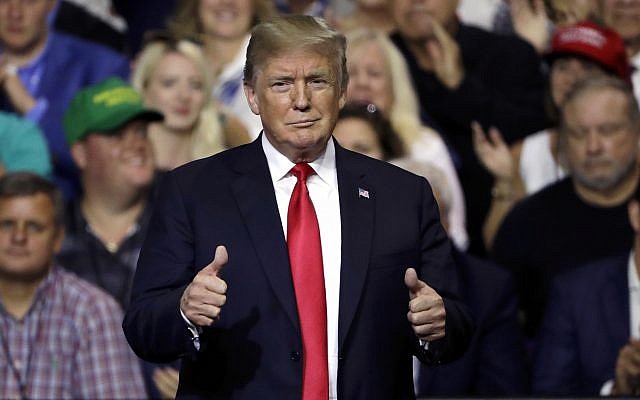
US President Donald Trump suggested Tuesday that talks with arch foe Iran were perhaps imminent, despite skepticism from Iran and outright rejection of the idea from the head of the country’s powerful Revolutionary Guards.
“I have a feeling they’ll be talking to us pretty soon,” Trump told a rally in Tampa, Florida, before adding: “And maybe not, and that’s OK too.”
He also used the occasion to again blast the “horrible, one-sided” 2015 nuclear deal between Iran and world powers from which the American president withdrew.
“It’s a horror show,” Trump said.
“I hope it works out well with Iran. They are having a lot of difficulty right now.”
Earlier on Tuesday, Revolutionary Guards commander Major General Mohammad Ali Jafari dismissed the idea of a meeting.
“Mr Trump! Iran is not North Korea to accept your offer for a meeting,” Jafari was quoted as saying by Fars News agency, the Reuters news agency reported. “Even US presidents after you will not see that day.”
Iranian Foreign Minister Mohammad Javad Zarif noted on Twitter that Iran and the US had two years of talks leading to the nuclear accord which the US left earlier this year.
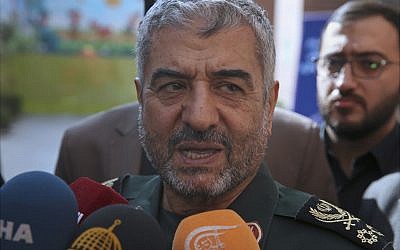
“US can only blame itself for pulling out & leaving the table. Threats, sanctions & PR stunts won’t work. Try respect: for Iranians & for int’l commitments,” he tweeted.
However Ali Akbar Nategh Nouri, a senior cleric and member of the influential Expediency Council, said Trump’s suggestion Monday that he would be willing to meet with Iranian President Hassan Rouhani should not be categorically rejected.
“It should be discussed in the Supreme National Security Council,” said Nategh Nouri, who is also a former aide to Supreme Leader Ayatollah Ali Khamenei. Nategh Nouri said “we have to contemplate” the gesture, but also cautioned “we should not rejoice over this offer and not get excited.”
“Trump may take advantage of this over-excitement,” he said, the state-run IRNA news agency reported. “It could be a test for us.”
Trump pulled the US out of a deal with several major powers and Iran earlier this year that was meant to prevent Tehran from developing nuclear weapons. He’s also said, however, that as renewed sanctions kick in, he expected Iran would call and offer to return to the negotiating table, and that “we’re ready to make a real deal.”
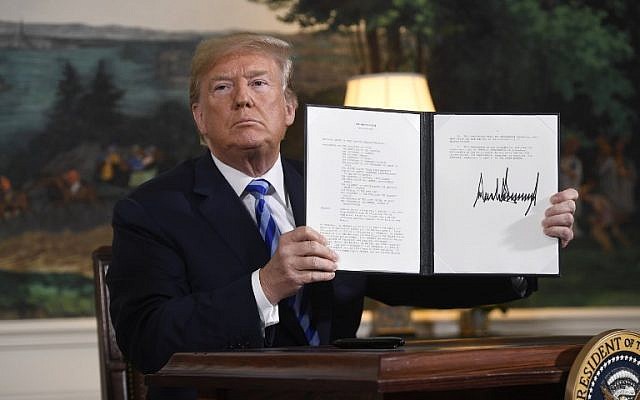
On Monday he said he could meet with the Iranians with “no preconditions,” adding that “if they want to meet, I’ll meet anytime they want.”
Former President Barack Obama held a brief phone call with Rouhani in 2013, as the talks that led up to the nuclear deal were getting underway. It was the first time the presidents of the two countries had spoken since the 1979 Islamic Revolution and the storming of the US Embassy, which led to the severing of diplomatic ties.
In his first public comments after the remarks, Rouhani himself avoided mentioning Trump’s comments, instead stressing the need for the other nations involved in the nuclear deal to forge ahead with their pledges of trying to salvage it.
“Today we are at a very critical point in history regarding the nuclear deal, and Europe’s transparent measures to compensate for the United States’ unlawful withdrawal from it are very important for the Iranian nation,” Rouhani said after talks with new British Ambassador Rob Macaire.
Britain, along with China, Germany, France, Russia and the European Union, are negotiating with Iran on preserving the deal.
In Washington, a senior State Department official said Secretary of State Mike Pompeo had no plans to meet with Zarif if they both participate at an Asian security forum in Singapore later this week. The official, who was not authorized to publicly discuss Pompeo’s schedule, said there were “no plans for any engagement with Iran” at the Association of Southeast Asian Nations Regional Forum.
Pompeo will be in Singapore for the forum and related events on Friday and Saturday.
There had been speculation such a meeting might be in the works. On Monday, Pompeo met with Oman’s foreign minister in Washington ahead of his trip to Singapore. Oman, which has good ties with both Washington and Tehran, has served as a facilitator of previous talks between the US and Iran, notably during the Obama administration.
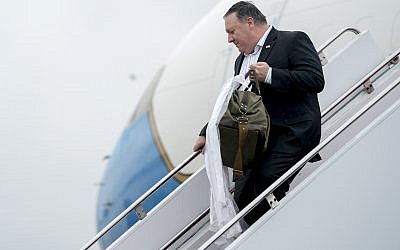
The Iranian leadership has previously ruled out one-on-one talks with Trump, following his decision to pull the United States out of the deal under which Iran was given relief from sanctions in return for curbs on its nuclear program.
Iran’s semi-official ISNA news agency quoted Rouhani’s political adviser Hamid Aboutalebi as saying that for talks to happen, the US needs to rejoin the deal.
Trump withdrew from the landmark nuclear accord in May, saying it was too generous to Iran. He has vowed to ramp up sanctions until Iran radically changes its policies, including its support for the Syrian government and regional militant groups, something the country’s leaders have long refused to do.
Even though Trump said there would be “no preconditions” to talks with Rouhani, he also did not walk back from any of those earlier demands.
With the first US sanctions due to come into effect next Monday, the economy in Iran has already been hit, giving rise to growing fears of prolonged economic suffering. Another round, covering other types of commerce, including oil purchases, goes into effect Nov. 4.
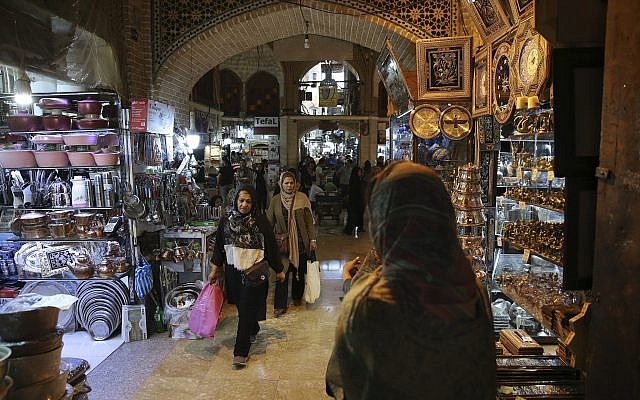
Rouhani on Tuesday again suggested Iran could cause major disruptions in the Gulf region by attempting to block key shipping lanes, saying “Iran has never sought tensions in the region and does not want there to be any problem for the world’s waterways, but it will never let go of its right to export oil,” the semi-official Mehr news agency reported.
With the US sanctions looming, the Iranian currency has been in freefall, hitting a new low Monday, at 122,000 to the dollar on the thriving black market. It recovered slightly to 115,000 on Tuesday, but concerns are growing as Iranians have seen their savings dwindle and purchasing power drop.
Heshmatollah Falahatpisheh, who heads the parliamentary committee on national security and foreign policy, suggested a US return to the nuclear deal would be needed before Tehran could think of negotiating.
“There can be no negotiations with the Americans raising the issue of talks from the position of power,” he was quoted as saying on the website of the Iranian parliament, calling Trump’s decision to pull out of the nuclear deal the “biggest blow to diplomacy.”
Reformist lawmaker Mostafa Kavakebian questioned negotiating with Trump, calling him “untrustworthy,” and also said now was not the time for talks.
“If this negotiation (is) carried out in any form, then it will be considered as surrender, and the Iranian nation will not surrender,” he said.
As reported by The Times of Israel
